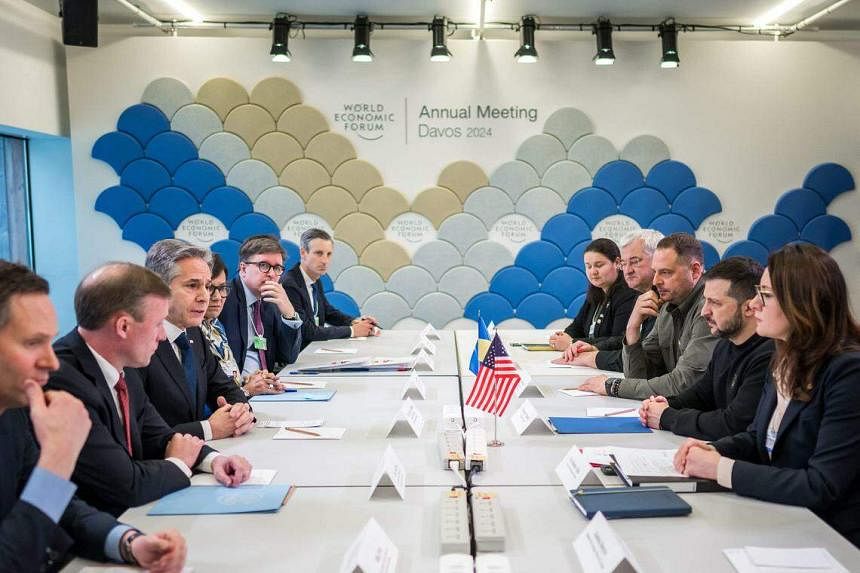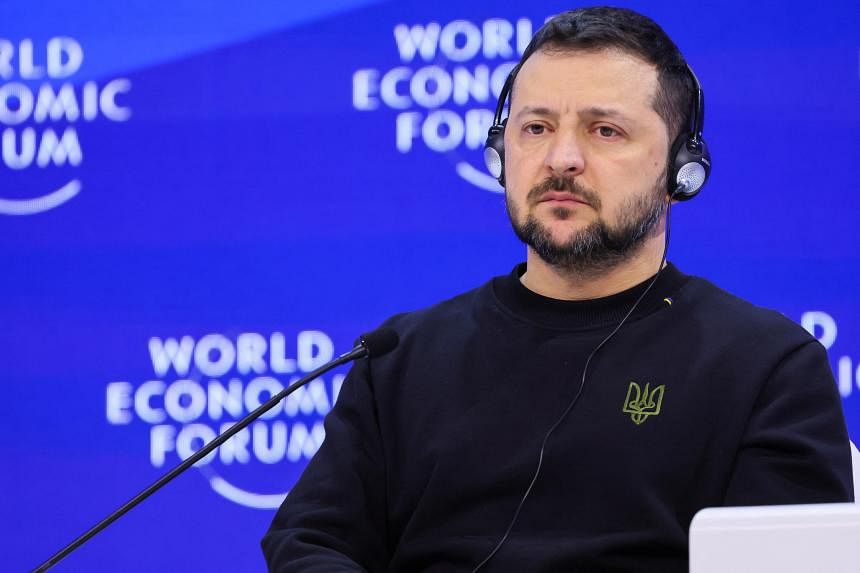DAVOS – Just days ago, it seemed that Ukraine’s President would be addressing delegates at the World Economic Forum’s (WEF) 2024 meeting in Davos, Switzerland, virtually, as he had done previously.
Or perhaps, the presence of Mr Volodymyr Zelensky was kept confidential because of security implications.
But arrive he did, and soon after, galvanised the Davos elite through a series of public and private meetings to draw attention to the conflict near Ukraine’s borders that is now nearly two years old.
Traffic on roads in the Swiss ski resort came to a standstill as Mr Zelensky and his security entourage moved. Phones flashed and delegates strained to get a glimpse as he walked past at the Congress centre, the venue for key meetings. Nearly 70 chief executives showed up for an early morning meeting with him on Jan 16.
His forceful and charismatic address – over a 45-minute session – seemed to bring some of the spotlight back on Ukraine at a time when Israel’s war with Hamas, which has crossed the 100-day mark, continues to take the top spot among conflicts of concern in the world.
At Davos, attacks by Houthi militants in the Red Sea, relations between China and the United States as the latter prepares for elections, a gap between the Global North and Global South, and other concerns also figured in discussions.
Repeatedly lashing out at Russia’s President during his address to the delegates, Mr Zelensky said: “(Vladimir) Putin embodies war.
“We all know that he is the sole reason why various wars and conflicts persist, and why all attempts to restore peace have failed. And he will not change. He will not change.”
Ukraine’s pitch for collective action began on Jan 14, a day before the President arrived in Davos. Together with Switzerland, Ukraine hosted national security advisers from more than 80 countries and international organisations to discuss a 10-point peace plan.
Formulated by Mr Zelensky, it calls for the withdrawal of Russian troops as well as the cessation of hostilities and restoration of Ukraine’s borders with Russia, among other points.
“Russia targeted not only Ukrainians, but people globally,” Ms Yulia Svyrydenko, Ukraine’s First Deputy Prime Minister, said in a statement after the meeting.
“More than 300 million people are suffering now of food insecurity,” she said, alluding to the sharp increase in wheat prices in the wake of the war.
The global implications of Ukraine’s war echoed in Mr Zelensky’s address too. “If anyone thinks this is only about Ukraine, they are fundamentally mistaken,” he said.
Warning of severe consequences if Mr Putin’s aggression was not stopped, he said: “In any dire confrontation, there is always a point where a catastrophe can be stopped. Ukraine is that opportunity.”
The Congress hall at Davos, where Mr Zelensky gave his address, was packed to the brim. He received a standing ovation at the end of his remarks. WEF president Borge Brende said: “I have never seen the hall so full.”
US Secretary of State Antony Blinken, who, along with US National Security Adviser Jake Sullivan, met Mr Zelensky in Davos on Jan 16, said Washington is determined to keep supporting Ukraine, and they were working closely with Congress to do that, the Associated Press reported.

The Biden administration has been struggling to win approval from Congress for a US$60 billion (S$80.7 billion) aid package for Ukraine due to opposition from Republican lawmakers.
Nato Secretary-General Jens Stoltenberg, when asked to comment on the Ukraine situation at another panel discussion, said there was cause for optimism, pointing to the country’s impressive gains in liberating territory and opening a grain export corridor in the Black Sea.
He also stressed that “support for Ukraine is not charity; it is an investment in our own security”.
Pitching for more investments, Mr Zelensky said that despite two years of war, Ukraine’s economy had grown more than 5 per cent in 2023, and its accession to the European Union is on track. “Strengthen our economy, and we will strengthen your security,” he said.
He also requested Switzerland to host a Global Peace Summit, and the Swiss government agreed.
But Russia dismissed Ukraine’s peace plans and declined to participate, wire agencies reported, quoting Kremlin spokesman Dmitry Peskov. “It is just a matter of talking for the sake of talking,” he said. “Without our participation, any discussion has no prospects.”
Security-related issues have been top of mind at the annual meeting of government officials, businessmen, policymakers and influencers, with a few sessions on tensions in the Middle East throughout the conference from Jan 15 to 19. Israeli President Isaac Herzog will address the forum on Jan 18.
During a session on the theme Securing An Insecure World on Jan 16, Mr Brende remarked: “We live in the most complex geopolitical world than any other Davos before.”
Responding to a question on the situation in the Middle East, Saudi Foreign Minister Faisal bin Farhan Al Saud said Riyadh would be interested in a normalisation deal with Israel that is linked to a two-state solution.
“We agree that regional peace includes peace for Israel, but that could only happen through peace for the Palestinians through a Palestinian state,” he said during the session.
Israel launched attacks on Gaza in response to an Oct 7 incursion by the Hamas militant group into Israeli territory. Fears are mounting that the war could be widening, with Iran and its proxies stepping up attacks across the region in solidarity with Hamas, which rules the Palestinian territory.
German Foreign Minister Annalena Baerbock described the situation as a “total disaster” for both Israeli and Palestinian civilians, and called for better humanitarian access to Gaza.
“Actually, we know the solution. We can only come out together on a plan on a ceasefire, on a plan on a two-state solution, but at the moment we are stuck in a vicious circle,” she said.


